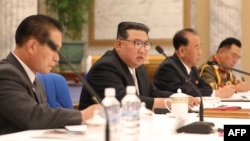North Korean leader Kim Jong Un doubled down on his nuclear arms buildup in the face of "hostile forces" as he wrapped up a key military meeting in Pyongyang where officials approved unspecified new operational duties for frontline army units.
North Korean state media on Friday said members of the ruling Workers' Party's Central Military Commission, during a three-day meeting that ended Thursday, decided to supplement an "important military action plan" for the operational duties of frontline army units and take further steps to strengthen the country's nuclear war deterrent.
North Korea hasn't specified the new operational duties for frontline units, but analysts say the country could be planning to deploy battlefield nuclear weapons targeting rival South Korea along their tense border.
During the meeting, Kim called for his entire army to "go all out" in carrying out the plans to bolster the nation's military muscle and consolidate "powerful self-defense capabilities for overwhelming any hostile forces and thus reliably protect the dignity of the great country."
The report by the North's official Korean Central News Agency did not include any direct criticism of Washington or Seoul amid a prolonged stalemate in nuclear negotiations.
Jolting an old pattern of brinkmanship, North Korea has already set an annual record in ballistic testing through the first half of 2022, firing about 30 missiles in over 18 launch events, including its first tests involving intercontinental ballistic missiles in nearly five years.
Kim has punctuated his recent tests with repeated comments that North Korea would use its nuclear weapons proactively when threatened or provoked, which experts say portend an escalatory nuclear doctrine that may create greater concerns for neighbors.
Short-range arsenal
While Kim's ICBMs grab much international attention, North Korea since 2019 has also been expanding its arsenal of short-range solid-fuel missiles threatening South Korea. The North describes some of those missiles as "tactical" weapons, which experts say communicates a threat to arm them with smaller battlefield nuclear bombs and proactively use them during conventional warfare to blunt the stronger conventional forces of South Korea and the United States. About 28,500 U.S. troops are stationed in the South to deter aggression from the North.
North Korea's apparent push to deploy battlefield nuclear weapons at frontline units had been predicted since April, when Kim supervised a test of a new short-range missile that state media said would "drastically" improve the firepower of frontline artillery units and "enhance the efficiency in the operation of tactical nukes."
Experts say North Korea's unusually fast pace in testing this year underscores Kim's dual intent to advance his arsenal and pressure Washington over long-stalled nuclear diplomacy. Talks have stalled since early 2019 over disagreements in exchanging the release of crippling U.S.-led sanctions against the North and the North's disarmament steps.
Kim has shown no intentions to fully give away an arsenal he sees as his strongest guarantee of survival. His pressure campaign is aimed at forcing the United States to accept the idea of the North as a nuclear power and negotiating economic and security concessions from a position of strength, experts say.
The recent military meeting came amid signs that North Korea is preparing to conduct its first nuclear test explosion since September 2017, when it claimed to have detonated a thermonuclear weapon that could be tipped on its ICBMs.
Experts say North Korea may use its next nuclear test to claim that it has acquired the ability to build a small nuclear warhead to fit its short-range missiles or other weapons it recently tested, including a purported hypersonic missile and a long-range cruise missile. Smaller warheads would also be necessary for the North's stated pursuit of a multiwarhead ICBM.







